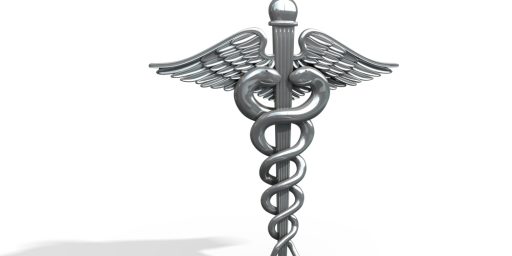Healthcare Reform: The Real Problem
Ezra Klein details why it’s so hard to get a comprehensive reform of our healthcare system passed.
There are three primary difficulties in finding the money for health-care reform. The first is that costs inside the system grow more quickly than incomes outside of the system. Imagine if your mortgage grew by 10 percent a year and your income grew by 3 percent a year. You might be able to handle that for a while, but eventually it would overwhelm you. That’s the problem for the House bill, too. The surtax on the rich raises enough money to balance out the first 10 years, but after that, health-care spending accelerates beyond it. According to the Joint Committee on Taxation, the cost of the coverage expansion is increasing by 9 percent a year at the end of the first 10 years, while the revenues are only increasing by 5 percent a year. Thus, deficit explodes outside of the first 10 years.
Luckily, there is one thing that grows as fast as health-care spending: health-care spending. If you raise money inside the system, then the revenues keep pace with the costs. Which gets us to the second problem: Liberals (particularly unions) have taken the major pot of money — the employer tax exclusion — off of the table. If you can’t touch that, then you can’t do very much: You don’t want to take all that money from Medicare, and you can only get so much from an excise tax.
The third problem is that the health-care reforms being considered simply don’t save that much money. Just as the system is unaffordable now, it is unaffordable six years after reform. So the final possible solution would be a more radical transformation of the system that actually saved money. The Wyden-Bennett Healthy Americans Act fits the bill. But few senators (or representatives) support it, as the plan is too ambitious, and entails too much disruption of existing insurance arrangements, for their tastes. Single-payer is rejected for similar reasons.
The problem, in the end, is simple enough: The easy revenue options — a small tax on the rich, or cuts in waste and abuse — don’t raise enough money. The hard revenue options don’t have any support. And the solutions that would save you money are ruled too radical.
Dave Schuler could have written that two years ago. Indeed, he probably did. That’s not an insinuation either that Ezra is cribbing from Dave or slow on the uptake; just that there’s pretty widespread agreement as to what the obstacles are among those who’ve been paying much attention.
Ezra’s conclusion, though, is tautological:
The problem is not insufficient money, or the relative growth in costs, or the savings. The problem is insufficient political will.
Well, yes. That’s pretty much the obstacle to getting any policy option enacted in a democracy. In this case, a goodly number of us think the proposed cure is worse than the disease. Or will make the disease worse.
In hashing this out with Dave over the past several months, mostly on OTB radio, he’s convinced me that 1) there is a legitimate crisis in our healthcare delivery system and 2) that the medical licensing cartel is a major component of the cost issue. There are some relatively non-controversial and non-painful ways to address this problem that aren’t even on the table. But aside from massively opening up our medical schools to qualified applicants and allowing nurses and PAs to do jobs they’re fully qualified but not allowed to do without physician supervision, most of the other changes necessary are sufficiently unpopular that they’re not going to happen until we’re closer to crisis.







The left tend to view the world as a zero sum game. You re-cut the pie to achieve “fairness”, but you don’t try to make more pies.
The idea of increasing competition in the health care personnel is a good one. But that is going to also require changes in the tort law. The time it takes to perform most medical interventions (e.g. fix a broken leg) is relatively constant, thus productivity isn’t driving costs down. In fact, because of the malpractice laws, productivity is slipping because of additional CYA testing or hand off to a specialist. If the CYA of the law requires you to go up to a physician anyway, then letting the nurse treat your common cold won’t increase productivity.
One thing no one seems to be talking about is that we are potentially on the cusp of some medical breakthroughs via genetics and nanotechnology. If your malfunctioning organ can be repaired by swallowing a pill with nanobots that will deliver a fix at the gene level, imagine the potential productivity gains. And like all the industries that have seen major productivity gains, the cost to deliver better goods/services decreases. But because the left only focuses on re-cutting the pie, we are actually in danger of stopping on the cusp of fixing the problem through eliminating new procedures because of cost.
Good post from Ezra. I’m inspired to write my Congressman to ask for him to support Wyden-Bennett.
This is probably understated though:
To the extent people have “gold-plated” health insurance plans because of the tax benefit, an excise tax would remove that incentive and the plans would disappear and raise no revenue.
To the extent people have “gold-plated” health insurance plans because they have costly preconditions, then the tax would be raising money from people least able to afford it.
Political will is needed to explain we can’t have gold plated health care without paying gold for it. We are demanding the best while not understanding it costs a hell of a lot. With the media and politicians baiting us that we can have everything for next to nothing we now have a country thinking that way.
There are only so many efficiencies to be had and after that it’s a trade off of costs and services. Reality bites but living in a fantasy world makes it bite harder later.
If you cut all the doctors income in half the savings would roughly equal one single years 5% to 7% annual increase in health care cost we experience each year. what would you cut the second year?
The problem is that the problem is not just one single thing. It is a whole host of problems throughout the system. Simplistic statements that the problem is a cartel restricting the number of doctors is one of the reasons we can not realistically address the real problem.
The average doctor in the US makes about the same as the manager of your local Wal Mart. Now which one is over paid?
The average doctor in the US makes about the same as the manager of your local Wal Mart. Now which one is over paid?
Do you have a link to this? Just curious. I do agree that doctors don’t make nearly as much as some people think they do-especially those who work at the primary care level. They probably work longer hours than the average Wal Mart manager though, and they also carry pretty heavy student loan debts.
Dave’s theory may be correct, though it should be noted other countries have lower costs without his cartel breakers. My practical experience with using extenders leads me to believe we will see only minor cost savings, if any.
Steve
Ah yes, but of course:
And what perchance is the disease James?
My answer, all of the above and those who fear “socialism†(never quite defined) more than a “disease†that they wish not to confront. My spleen properly vented, I will risk all by taking on this bête noire:
There is no medical “cartel†that controls or limits the number of docs. If there is a rate limiting factor it lies in how American Academic Medicine functions, and the number of instructors available to teach at the bedside. That cannot be covered or discussed in detail until some reforms are introduced. I may be wrong, as I have been in the past, but I doubt Dave Schuler would advance this need as a reason not to seek some degree of reform.
Psssst: Do not confuse the difference between a a nurse, a nurse practitioner, and a physician assistant. Making them equivalent, or implying that the absence of available physician consultation is acceptable shows a profound lack of understanding of how proper medicine is practiced. But more on that subject some other day.
R. Paul Miller, MD
There’s a word for people who complain we lack the political will to force people to do what we think they should do, but it escapes me at the moment.